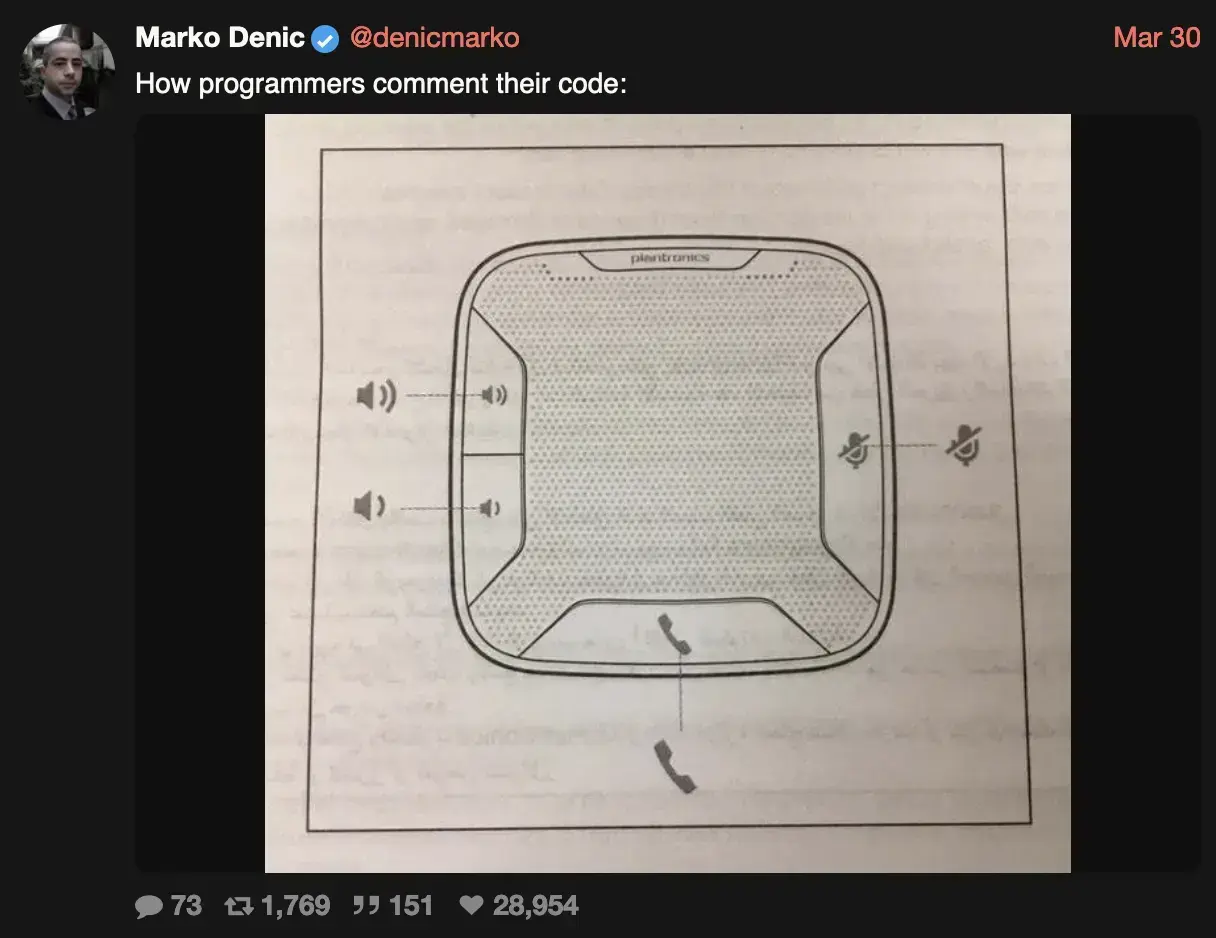I got a media failed to load error at first and thought that was the joke
Both jokes can be true 😅
Same with BIOS descriptions.
FGTSAB switch [toggles the FGTSAB setting]
infuriating
I love it
Yup, my first thought as well. While those days are thankfully over, those braindead BIOS “help” messages remain etched into my mind forever.
Are the recent ones any better? I got a gigabyte b660m for 12th gen intel and it’s really bad at that. Had to look up a lot to figure out things.
Maybe it’s an ASUS thing but both my current and previous boards have been pretty good with the help texts.
Snapmaker Luban is amazing with its help messages.
Every setting in this 3D slicer is completely explained how the setting works, what the different options are, with pictures and even what every option is the most optimal in whatever situation.
Too bad that it isn’t the best program unless you have a Snapmaker, and even then…
Love having to enable “support for sleep state 5” to turn off USB power when the PC is off
It’s so bad it’s almost artistic
You mean autistic.
An autistic coder would have documented this feature to the point of pedantry.
And who updates that documentation three months later when a bug gets fixed or a new requirement get implemented?
Good code is self-explanatory. You should only comment your code if it does something unexpectedly complicated.
That being said, it’s always a good idea to write a manual, about how to use the code. Don’t document how it works, because those who can code will understand it anyways, and those who can’t, have no need to understand it.
Asinine business logic can still make some things very hard to read and digest no matter how well-planned and well-written it is (particularly if it is rushed by the business meaning that engineers don’t have time to do it well). As such, there are places where code can’t/won’t be self-documenting to a useful degree.
Good code is self-explanatory. You should only comment your code if it does something unexpectedly complicated.
The code shows what is being done. The comments should explain the why.
This is something a lot of people don’t seem to understand. Even if code is self-explanatory, I want to know why it was designed that way.
I’ve fixed bugs where the fix was only a one line change, but it was extremely difficult to figure out, so I left a 10ish line comment above it explaining why it has to be done that way.
Yes. This 1000x. I hate it at work when I come across code that was written 3 years ago that has literally no traces of why it’s there and a quick summary of what it does. Especially because that code is always the most abbreviated spaghetti you’ve ever seen. People should stop thinking (their) code documents itself because 99.999% of programmers cannot do it right.
I really like the Google way of coding: assume the person reading the code is the most 1337 programmer ever, BUT that this person knows absolutely nothing about the project
Always code as if the guy who ends up maintaining your code will be a violent psychopath who knows where you live.
Hard disagree. It’s a lot easier and faster to understand a function that is prefaced with a small line of text explaining what it does rather than trying to figure it out yourself.
It’s not about whether you can understand the code or not, it’s about efficiency and clarity.
Yeah, just 15 seconds and jot down a comment. Whenever I’m even hesitant, I just leave a comment. Doesn’t hurt anything and it can always be removed if not needed
Easier to remove later rather than add it after the fact
If done right, the “what it does” is in the method name. If your method is too complicated to summarize in its name, chances are good you should split it up or extract parts of it.
Hard disagree - that’s just dumb:
// Calculates tax function calculateTax() { }Hard disagree - that’s very helpful:
// Calculates Personal Income Tax by formula from section 1.2.3 of tax code. Other taxes like VAT are not calculated. function calculateTax() { }This guy gets it.
If it calculates personal income tax, just call
calculatePersonalIncomeTax.Why not
calculatePersonalIncomeTax123then?I’m a new developer. Is that referring to page 123 of the in-house documentation? Version 12.3 of the code? I have no clue.
You’d have to call it something like calculatePersonalIncomeTaxPerTaxCodeSection1_2_3, but I get exhausted just looking at that. There comes a point where the cognitive work of reading crazy long camel case names is more trouble than it’s worth.
An explanation of what specification a function was written to implement is a perfectly appropriate comment. Could be improved by a direct link where possible. But it’s worth noting what that comment isn’t doing - specifying any implementation details. For that, I really can just read the code.
Is that state, federal, or combined?
Add a flag.
This is true, but it’s easier and faster to parse plain English and so if I don’t adequately comment my code the first time. I will be commenting it when I have to return to it for whatever reason. Honestly the second round of commenting is more verbose and clearer than the function x does y style of comments I tend to make when coding the first time
Regardless, comments do speed up understanding.
Dankpods screen cap?
I don’t know. Anyway, DankPods is awesome, there’s a great Lemmy community dedicated to his channel: !dingusland@suppo.fi
Our code base is filled with “//constructor”, “//destructor”, “//assignment”, or the ever enlightening “Foo GetFoo(); // GetFoo”.
This is not what they mean by self-documenting code.
I had a old job that told me that code is “self documenting” if you write it “good enough”. And that comments were unnecessary.
It always annoyed the heck out of me. Comments are imo more helpful than hurtful typically.
Is it just me? Or am I weird? Lol.
I follow these simple rules and encourage my colleagues to do so
-
If I’m just shuffling jsons, then yes, the code should be self documented. If it’s not, the code should be rewritten.
-
If I implement some complex logic or algorithm, then the documentation should be written both to tests and in the code. Tests should be as dull as possible.
-
If I write multithreading, the start, interruption, end, and shared variables should be clearly indicated by all means that I have: comment, documentation, code clearness. Tests should be repeated and waits should not be over 50ms.
-
I absolutely agree, and I too hate this stupid idea of “good code documenting itself” and “comments being unnecessary”.
I have a theory where this comes from. It was probably some manager, who has never written a single line of code, who thought that comments were a waste of time, and employees should instead focus on writing code. By telling them that “good code documents itself”, they could also just put the blame on their employees.
“Either you don’t need comments or your code sucks because it’s not self-documenting”
Managers are dumb, and they will never realize that spending a bit of time on writing useful comments may later actually save countless hours, when the project is taken over by a different team, or the people who initially created it, don’t work at the company anymore.I’ve never had a manager that was even aware of the comments vs. no comments issue. If I ever had, I would have just told them that a lack of comments makes the original coder harder to replace.
Its definitely a balance. Good code shouldn’t need much commenting, but sometimes you have to do something for a reason that isn’t immediately obvious and that’s when comments are most useful. If you’re just explaining what a snippet does instead of why you’re doing it that way, there’s probably more work to be done.
Code is not self documenting when decision trees are created based on some methodology that’s not extremely obvious
Code should always by itself document the “how” of the code, otherwise the code most likely isn’t good enough. Something the code can never do is explain the “why” of the code, something that a lot of programmers skip. If you ever find yourself explaining the “how” in the comments, maybe run through the code once more and see if something can be simplified or variables can get more descriptive names.
For me, that’s what was originally meant with self-documenting code. A shame lazy programmers hijacked the term in order to avoid writing any documentation.
lazy programmers
I don’t think they’re lazy, I think they’re not good writers. Not being able to write well is very common among programmers (not having to communicate with written language is one reason a lot of people go into coding) and in my experience the Venn diagrams for “not a good writer” and “thinks comments are unnecessary” overlap perfectly.
Comment should describe “why?”, not “how?”, or “what?”, and only when the “why?” is not intuitive.
The problem with comments arise when you update the code but not the comments. This leads to incorrect comments, which might do more harm than no comments at all.
E.g. Good comment: “This workaround is due to a bug in xyz”
Bad comment: “Set variable x to value y”
Note: this only concerns code comments, docstrings are still a good idea, as long as they are maintained
Docstring are user documentation, not comments. User documentation, with examples (tests), is always useful.
As long as it’s maintained. Wrong documentation can often be worse than no documentation.
What a function does should be self evident. Why it does it might not be.
In my opinion, it strongly depends on what you’re coding.
Low-level code where you need to initialize array indices to represent certain flags? Absolutely comment the living shit out of that.
High-level code where you’re just plumbing different libraries? Hell no, the code is just as easily readable as a comment.I do also think that, no matter where you lie in this spectrum, there is always merit to improving code to reduce the need for documentation:
- Rather than typing out the specification, write a unit/integration test.
- Rather than describing that a function should only be called in a certain way, make it impossible to do it wrongly by modelling this in your type system.
- Rather than adding a comment to describe what a block of code does, pull it out into a separate function.
- Rather than explaining how a snippet of code works, try to simplify it, so this becomes obvious.
The thing with documentation is that it merely makes it easier to learn about complexity, whereas a code improvement may eliminate this complexity or the need to know about it, because the compiler/test will remember.
This does not mean you should avoid comments like they’re actively bad. As many others said, particularly the “why” is not expressable in code. Sometimes, it is also genuinely not possible to clean up a snippet of code enough that it becomes digestable.
But it is still a good idea, when you feel the need to leave a comment that explains something else than the “why”, to consider for a moment, if there’s not some code improvement you should be doing instead.Hard disagree on your first point. Name the flags with descriptive name, move this initialisation to a function, and there you go, self-documented and clear code.
I’m with you but sometimes you don’t have the chance in low level. Max you can do is create local variables just so the bits you’re XORing are more obvious. And whenever you’re working with something where that’d be wasteful and the compiler doesn’t rid if it, you’re better off with comments (which you need to maintain, ugh)
Hmm, maybe my opinion is just shit in that regard. I don’t code terribly much low-level, so I’m probably overestimating the complexity and underestimating the options for cleaning things up.
That was kind of just a random example, I felt like there were many more cases where low-level code is complex, but I’m probably basing this off of shitty low-level code and forgetting that shitty high-level code isn’t exactly a rarity either.
Code is the what. Comments are the why.
Few things worse than an out of date comment.
Good code is self documenting as in you don’t need to describe what it is doing and it is clear to read. Whoever says that and isn’t just repeating what they heard understands that whenever you are doing something not explicit in the code it should be on a comment.
Workarounds and explaining you need to use this structure instead of another for some reason are clear examples, but business hints are another useful comment. Or sectioning the process (though I prefer descriptive private functions or pragma regions for that).
It also addresses the hint that the code should be readable because you’re not going to have comments to explain spaghetti. Just a hint, doesn’t prevent it. Others also said it, comments are easier to get outdated as you don’t have the compiler to assist. And outdated comments lead to confusion.
What they mean is that the variable names and function names are documentation.
For example changing “for( i in getList() )” to “for( patient in getTodaysAppointments() )” is giving the reader more information that might negate the need for a comment.
Have you ever worked in a place where every function/field needed a comment? Most of those comments end up being “This is the <variable name>, or this does <method name>”. Beyond, being useless, those comments are counter productive. The amount of screen space they take up (even if greyed out by the IDE) significantly hurts legability.
And a good IDE let’s you hide it so… what is your point?
The issue with having mandatory useless comments is that any actually useful comments get lost in the noise.
I get what you’re saying. Perhaps I just haven’t had too many variables and such that have had such comments. VsCode shows the comments on hover when you’re in other parts of the code base. Which makes most any comment useful because something that is obvious in one part of the code isn’t immediately obvious in another. Though, that necessitates making comments that actually help you figure that out.
Document intentions and decisions, not code.
I actually agree that “good enough” code can be self-documenting, but it isn’t always enough to achieve my goal which is to make the code understandable to my audience with minimal effort. With that goal in mind, I write my code as I would write a technical document. Consider the audience, linear prose, logical order, carefully selected words, things like that… In general, I treat comments as a sort of footnote, to provide additional context where helpful.
There are limits to self-documenting code, and interfaces are a good example. With interfaces, I use comments liberally because so many of the important details about the implementation are not obvious from the code: exactly how the implementation should behave, expected inputs and outputs under different scenarios, assumptions, semantic meaning, etc. Without this information, an implementation cannot be tested or verified.
I have worked on larger older projects. The more comments you have, the larger the chance that code and comment diverge. Often, code is being changed/adapted/fixed, but the comments are not. If you read the comments then, your understanding of what the code does or should do gets wrong, leading you on a wrong path. This is why I prefer to have rather less comments. Most of the code is self a explanatory, if you properly name your variables, functions and whatever else you are working with.
I write such comments because I have to.
Company policy.
Also we have to specify every line of code and what it should do…
// this line increments the value of i by 1
i++;
I hope they get paid per line of code.
I hope i never have to work with you.
Lol leave. That is so many levels of braindead.
I feel like I am going to have to do the same thing in the end, to get my hand-over accepted.
Should I just copy the line of code and make a comment next to it with:// It does <paste line of code>Do you license every comment of yours? If yes, why? Tbh i’m just curious
Not every. The quick, very-low effort ones, I just leave.
Why:
I saw another post with “Anti Commercial AI License”, then wen on to read the license and went, “Neat!”.- It makes it easier for anyone to decide what to do if they want to use my comment/post (in cases where it actually has something useful)
- It makes life just a bit harder for people data-mining for AI
- That way, some data entry worker will probably ask for a raise and probably even get it and maybe some entrepreneur going “AI everywhere!” will think twice.
- Or there will be a chatbot spouting “Anti Commercial AI License” or “CC By-NC-SA” in their answer text, which would be hilarious.
How are you inserting your signature? is it manually? Do you have some kind of keyboard shortcut to insert it?
For now, I have just saved it in my clipboard application, so I copy-paste.
I was hoping that either the KDE Social web interface would add a “Signature” feature or I would pick some Lemmy application that would allow that, but for now it’s just this.
Perhaps, if I feel like it’s being too frequent, I may set a compose key for it.
I would smash everything into a handful of overly-complicated lines.
I loved doing this is school, just trying to mess up my teachers.
Sometimes I think after i retire, I should teach. In the hopes that i could inspire people to write good code, instead of a lot of the garbage i see in the industry. This comment makes me sad.
I just want to be clear, this was like highschool cs classes. I took things a bit more seriously in college.
I never wrote messy code or illogical code, or any code that didn’t work. We were learning C++ in those days and if you know anything about C++, you can basically cram an entire program into a single line. You can also do some shorthand stuff for calculations and updates to variables… So while the class was instructed to use whitespace and comments and update variables like “var = var + #” I would do var += #… I wouldn’t comment it, mainly out of hubris.
I was pretty good at it but I was lazy as all hell with it.
Fs.?g??yy V>

A real comment in our junior year game engine codebase.

visiblen’t
this is why i very rarely comment with descriptive comments. If you’re reading my code and don’t understand what it is, even with how shit it is, you have no business reading whatever fucking crackpot shit im writing.
You must be fun to work with.
you say this like im the type of person to write code with other people.
Doesn’t matter. Even if it’s your code, you might revisit something you made months or a year after doing it and having comments will speed up your work. It’s a very basic good practice.
i do have comments, for some things, but there are a lot of “commenting” standards that are just shit. I find i don’t care what the actual piece of code is doing, i care more about it’s place in the rest of the code, and i’d much rather have “anti comments” instead.
/* * Gets stupidFuckingInteger * * @returns stupidFuckingInteger */ public double getStupidFuckingInteger() { return stupidFuckingInteger; }This being a double physically hurts
The lack of a return type declaration makes this sooo good.
It has the return type declared to be
double.I cannot read. Even better.
Makes sense, people looking for int would find a double
Reminds me of a job I had where c# summaries were mandatory and people used a documentation generator just like that.
/// Ages the Category. public int AgeCategory (…)
plenty of APIs in Java have documentation like that and it is worst when I read the documentation in order to find out the definition of the nouns and verbs used there and then it is just like that
At work we let Typescript and descriptive naming document our code. Only when something is a workaround or otherwise weird will we add comments. So far it has worked great for us.
The code is self explanatory
The words of the machine are sacred, Only the impure need explanation

It explains what it does, it does not confirm that it is what was intended.
/********** Setting up the fkuArray **********/
fkuArray = array(…
Well, fku that array indeed.
How bad programmers comment their code. Good programmers don’t comment at all and let the code speak for itself, leaving commenting to some obscure and arcane implementation the coder left in after a week long binge on caffeine and gummy bears.
“What does this section of code do?”
Run it and find out, coward.
Nah. It should be obvious by just looking at it in code. If it isn’t, you haven’t extracted single purpose methods out of it yet.
Just having clear and concise variable names often goes a long way. Avoid using abbreviations.
Breaking out the code into functions helps limit the number of variables within a scope, which makes it easier to name them.
Code should absolutely speak for itself. But the occasional comment is still good to explain the ‘why’ of the code when the why isn’t very obvious, often due to a niche requirement. Also any time you have to break out a hack, that needs comments up the ass, what was the bug, what URL did you find the fix at, why does this hack work, etc etc. It’s very satisfying to go back and remove those hacks after they are no longer needed, often because the underlying technology fixed the bug that had to be hacked around.
Yeah, hence me mentioning the arcane code nobody knows what it does.
It definitely feels great when I get to remove the
//hack abc due to bug in library xyz version 1.4.5, issue tracker says it’s fixed in 1.5.0. - link

This is the truth. In my experience, the people who often writes comments are also writing the most incomprehensible code.
Comments are frequently getting outdated as well, so they’re not in great help understanding the code either.
I was rewriting some old code of mine and ended up stripping out the comments. I kept reading them instead of the code, which I had been changing, and they were irrelevant. (I added new comments back in, though a big reason to rewrite was to make the code more self-explanatory.)

















